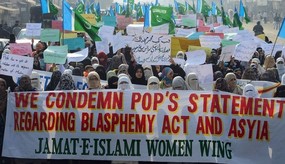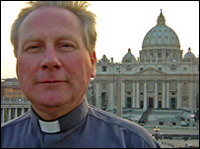Interfaith Dialogue: January 2011 Archives
 Pakistani Muslims protested the part of Pope Benedict's State of the World address where he says the blasphemy law ought to be repealed. Well, Pakistan's Muslims don't think it's wise.
Pakistani Muslims protested the part of Pope Benedict's State of the World address where he says the blasphemy law ought to be repealed. Well, Pakistan's Muslims don't think it's wise.The online magazine Catholic Culture (here below) carried this story today, which ran yesterday in the AFP, about a Muslim policeman killing Christian women when tensions are already running following the killing of Christians in a church. More sadness for humanity. It is also incredibly sad that the Egyptian Ambassador to the Holy See has stated that the view that Christians are not persecuted. Can you believe it??? The Ambassador's head is in the sand.
Less than two weeks after a church bombing in Alexandria left 21 Coptic Christians dead, an off-duty policeman shot four Christians on a train, killing a 71-year-old man. A fifth person was also wounded.
The Pope always seems to get criticized at every twist-and-turn. He announced a gathering in Assisi to have a World Day of Prayer in part to commemorate the 25th anniversary of the first Day of Prayer hosted by John Paul II and to build bridges -he is the Pontiff, the "bridge builder"--after all. Benedict's noble and good motive is this: "I will make a pilgrimage to the town of St Francis, inviting my Christian brethren of different confessions, leaders of the world's religious traditions and, in their hearts, all men and women of good will, to join me on this journey in order to commemorate that important historical gesture of my predecessor, and solemnly to renew the commitment of believers of all religions to live their religious faith as a service to the cause of peace."

These early days of 2011 are shaping up to be an interfaith challenge with all sorts of messages, clarifications and critiques of current events between Christians and Muslims. The latest, noted here, is a statement given by the Pope's ambassador, the Apostolic Nunccio to Egypt, Archbishop Michael L. Fiztgerald, M. Afr. The Nuncio,73, is a former head of the Pontifical Council for Interreligious Dialogue. The statement was given in response to a request of the Coptic Orthodox Patriarchate clarifying the Pope's January 2nd statement against the attacks against the Coptic faithful.
The statement of His Holiness Pope Benedict XVI with regard to the tragic attack on the Church of the Saints in Alexandria has met with some criticism. It may therefore be helpful to give an account of what the Pope actually said and of his recent teaching on the way to peace.
Jesuit Father Federico Lombardi, Director of the Holy See Press Office, responded to what I believe is unfair, even bigoted criticism of Pope Benedict by Imam Ahmed al-Tayeb of Egypt following the January 1st bombing of a Coptic Orthodox church. 21 dead and nearly a 100 wounded. Clear it is to me, the Muslim world rarely pays close attention to what the Catholic Church believes and what the Pope says.
Ahmed al-Tayeb, current current Imam of al-Azhar Mosque, condemned the bombing. The imam paid a visit to the head of the Coptic Orthodox Church, Pope Shenouda III to offer condolences. But his good will toward the Christians however, also include a strident criticism Pope Benedict who asked civil authorities to protect Christians. In Al-Tayeb's mind the Pope's request was an "unacceptable interference in Egypt's affairs." Further, said al-Tayeb, "I disagree with the Pope's view, and I ask why did the Pope not call for the protection of Muslims when they were subjected to killings in Iraq?"

